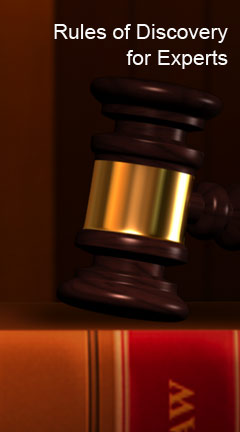Archival Notice
This is an archive page that is no longer being updated. It may contain outdated information and links may no longer function as originally intended.
Home | Glossary | Resources | Help | Course Map
In both federal and state courts, rules of criminal and civil procedure have been enacted to provide for the discovery process.
Discovery and inspection in federal criminal cases are generally governed by Federal Rules of Criminal Procedure (FRCrimP) 16 or state rules of a similar nature. In many state courts, the federal rules have either been adopted directly or used to provide the basis for the state's criminal procedural rules.
Discovery actions in federal civil cases are usually governed by Federal Rules of Civil Procedure (FRCivP) 26 through 37. In state court, civil discovery operates under state statutes and rules, many of which are based on FRCivP.
Throughout this module, the primary reference is to the federal rule because it is a common basis for both federal and state courts. The expert witness should be aware that state rules may vary from the federal rules. Therefore, the expert should consult, at the earliest opportunity, with the attorney who has identified him as a witness for the case.
All procedural rules must be liberally construed to secure just, speedy and inexpensive dispute resolution as well as simplicity, fairness and the abolition of unjustifiable expense and delay.
In both criminal and civil contexts, the intent of discovery is to enable both parties to obtain the necessary evidence to evaluate and resolve their dispute expeditiously and to eliminate surprise during trial preparation. These objectives are accomplished by:
- Compelling disclosure during the period preceding trial rather than during trial.
- Enabling parties to clarify and narrow the basic issues.
- Educating parties, in advance, of the real value of their defenses and claims.
- Assisting parties with the preparation and presentation of their cases.
(Source: 23 Am. Jur. 2d Depositions and Discovery § 1.)
Additional Online Courses
- What Every First Responding Officer Should Know About DNA Evidence
- Collecting DNA Evidence at Property Crime Scenes
- DNA – A Prosecutor’s Practice Notebook
- Crime Scene and DNA Basics
- Laboratory Safety Programs
- DNA Amplification
- Population Genetics and Statistics
- Non-STR DNA Markers: SNPs, Y-STRs, LCN and mtDNA
- Firearms Examiner Training
- Forensic DNA Education for Law Enforcement Decisionmakers
- What Every Investigator and Evidence Technician Should Know About DNA Evidence
- Principles of Forensic DNA for Officers of the Court
- Law 101: Legal Guide for the Forensic Expert
- Laboratory Orientation and Testing of Body Fluids and Tissues
- DNA Extraction and Quantitation
- STR Data Analysis and Interpretation
- Communication Skills, Report Writing, and Courtroom Testimony
- Español for Law Enforcement
- Amplified DNA Product Separation for Forensic Analysts


